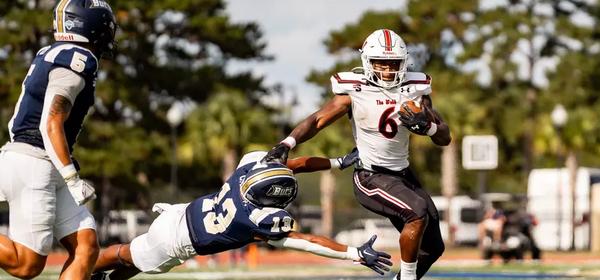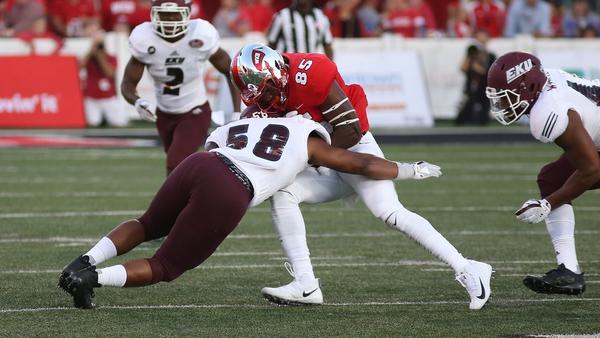•
Written By
Written By
•
•
•
Loading article...
Written By
Written By
The Atlantic Sun-United Athletic Conference split leaves the ASun one member away from losing automatic bid status, but is the conference worried?
Written By
Omar-Rashon Borja
Senior Writer, Editor, Historian
Written By
Omar-Rashon Borja
Senior Writer, Editor, Historian

The conference split that has occupied everyone’s minds for almost a year was finalized. The United Athletic Conference split from the Atlantic Sun Conference. The five football-playing schools of the Atlantic Sun merged with the last three members of the WAC to elevate the United Athletic Conference from a football-only entity to an all-sports one.
Naturally, the United Athletic Conference, a league built on an empty dream of FBS grandeur, draws everyone’s attention in this move. Nonetheless, their non-football counterpart is in just as unique a situation.
The split leaves the Atlantic Sun with seven numbers, the minimum necessary to retain an automatic bid to NCAA Tournaments. Normally, this would alarm any conference. However, the ASun Conference’s current membership may indicate the conference is stable.
Five of the seven Atlantic Sun schools are private institutions with enrollments of fewer than 5,000 students. Queens University in Charlotte has the lowest enrollment with just around 2500 students, making it one of the smallest schools in Division I. The two public schools, Florida Gulf Coast and North Florida have large enrollments, but not large enough to attract attention from other Division I conferences, at around 16,000 students each.
None of the Atlantic Sun additions would turn a one-bid mid-major basketball league into a multi-bid league. Florida Gulf Coast’s 2013 Sweet 16 run was unforgettable, but it was also 12 years ago. Lipscomb made the NIT Championship game in 2019, but NIT runs have never driven conference realignment, especially due to the low price of a unit.
Furthermore, the geography of nearby conferences makes poaching the Atlantic Sun hardly worth the costs. The Southern Conference could take both Jacksonville schools from the ASun to enter Florida but it divides its media deal further to schools that would not increase the league’s media value. Additionally, neither school plays football, causing further rifts in the league.
There is some logic to the CAA adding the Jacksonville schools, but it would create further division in a sprawling league that features schools in Massachusetts and New York.
The biggest threat would be the Big South, which has a slightly more stable membership total of nine. However, the move would be a lateral one. More importantly, Atlantic Sun schools would receive less money from coveted NCAA basketball tournament units.
An NCAA men’s basketball tournament unit currently pays conferences around $2 million per year for each game they play in the “Big Dance”, with each unit lasting six years. This means ASun schools would split $2 million per year over the subsequent six years for each game the conference plays in the Men’s basketball tournament. Roughly, each Atlantic Sun school would receive around $47,619 from the NCAA just for existing. On top of this, the Women’s basketball tournament also began distributing units this year. Each conference received $113,000 per unit this year, and the number will grow to around $180,000 in 2027. This distribution of tournament money could keep the Atlantic Sun at seven members for years.
The Atlantic Sun’s aversion to the Pandora’s Box that is college football has protected it from realignment losses for years. The conference has lost just five members since 2015: NJIT, Kennesaw State, Liberty, and Jacksonville State. NJIT joined the ASun after being independent for a few years and left after finally receiving an offer for a better geographic fit, while the latter three moved to Conference USA because of football. The last member to leave the ASun to pursue better opportunities in Olympic sports was USC-Upstate in 2018. Not having football seems to help keep the Atlantic Sun stable.
In Division I sports, seven could be the loneliest number. One defection could kill the Atlantic Sun Conference. Nonetheless, there seems to be strength in undesirability and avoiding football for the league.



United we 𝐑𝐎𝐀𝐑 The University of North Alabama is proud to officially join the rebranded United Athletic Conference on July 1, 2026! 📰: tinyurl.com/UNAtoUAC #RoarLions 🦁